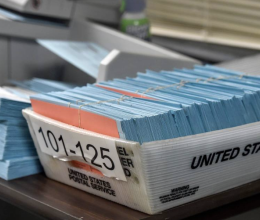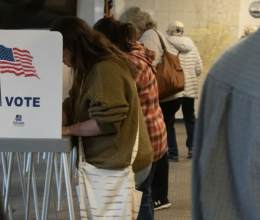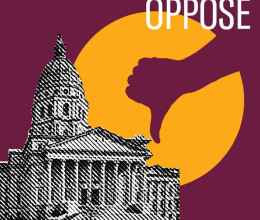
Doug Bonney, Legal Director of ACLUKS testifies on Wednesday, September 2nd at the State Capitol against K.A.R. 7-23-15, which would impose a 90 day period during which voter registration applicants would be required to complete all of the voter registration requirements under Kansas law. K.A.R. 7-23-15(b).
Read his testimony and news coverage on the hearing below.
ACLU Foundation of Kansas Testimony Against K.A.R. 7-23-15
Thank you for this opportunity to provide public comment on the regulatory changes proposed by the Secretary of State’s Office. My name is Doug Bonney and I am the Legal Director of the ACLU Foundation of Kansas.
The ACLU has a broad mandate to protect civil liberties, and the right to vote is one of our most treasured liberties. In fact, the right to vote is fundamental to our constitutional democracy.
Today, I want to address the Secretary of State’s proposal to promulgate K.A.R. 7-23-15, which would impose a 90 day period during which voter registration applicants would be required to complete all of the voter registration requirements under Kansas law. K.A.R. 7-23-15(b). Under the proposed regulation, if an applicant fails to complete the voter registration application within 90 days, “the voter registration application shall be rejected by the county election officer and the county election officer shall designate the voter registration application as cancelled.” Id. Moreover, applicants whose applications have been so cancelled “shall be required to submit a new voter registration application in order to become registered to vote.” K.A.R. 7-23-15(c).
Since January 1, 2013, new voters seeking to register to vote in Kansas for the first time have been required to supply documentary proof of citizenship before their names can be entered on the voting rolls. This aspect of the SAFE Act has caused a huge problem in Kansas. Many people do not have copies of citizenship documents with them when they complete voter registration forms. In such cases, the county election officers accept the application form and place the voter’s application in “suspense status” pending receipt of the missing information. This bottleneck has caused the number of would-be voter registrants in so-called “suspense status” to mount over the 32 months that Kansas has required documentary proof of citizenship. Most recently, the suspense list had grown to include more than 30,000 people.
Historically, there have always been some people who failed to complete the registration process properly, often because they failed to sign their registration applications or failed to provide their addresses. Before 2013, the state-wide suspense list had a few hundred names on it, and those names had accumulated slowly over a period of many years.
Now, however, the Secretary of State’s proposed regulation would require applicants to complete their voter registration applications within 90 days or start the process over entirely. The ACLU of Kansas opposes the proposed regulation for three reasons.
First, the proposed regulation flies in the face of historical precedent. Since time immemorial, applicants have been able to go back to the county election officer and supply the missing information at any time, even years later, and without having to fill out a new voter registration form. There is no valid reason for changing this unlimited time. In fact, the only reason for this proposed change is the fact that the documentary proof of citizenship requirement of the SAFE Act has caused a huge and embarrassing backlog of voters on the suspense list. That is not an adequate reason to change the unlimited period that Kansas voter applicants have historically had to complete their registrations.
Second, even assuming for the sake of argument that some limitations period for completing a voter registration application is necessary, 90 days is insufficient. Applicants whose names go on the suspense list are busy people who may not have ready access to documents proving that they are citizens. For instance, they may not have a passport or a certified copy of their birth certificate. They deserve more than 90 days to get those documents in order and to return to the county elections office to complete their voter registration. Because elections occur only a few times a year at most, applicants should have at least one election cycle (two years) to complete their voter registration applications.
Third, the proposed regulation exceeds the authority that the Legislature delegated to the Secretary of State.
The authority of state agencies to “adopt, promulgate, amend and rescind rules and regulations” is administrative, not legislative, Kansas Gas & Electric Co. v. Kansas Comm'n on Civil Rights, 242 Kan. 763, 765 (1988), and such authority must be conferred by statute, Pork Motel, Corp. v. Kansas Dept. of Health & Environment, 234 Kan. 374, 378 (1983). A rule or regulation that goes beyond what a statute has authorized, that violates the statute, or that alters, extends, or limits the source of its legislative power is void. Woods v. Midwest Conveyor Co., 231 Kan. 763, 771 (1982).
The rules enabling provision of the proof of citizenship statute provides as follows: “The secretary of state may adopt rules and regulations in order to implement the provisions of this section.” K.S.A. § 25-2309(s). Nothing in Kansas’s voter registration statutes suggests that Kansans must complete their voter registration applications within 90 days of the time the county election officer receives an application. See K.S.A. §§ 25-2301 to 25-2359. Thus, the proposed regulation – specifically K.A.R. 7-23-15 – does not “implement the provision of” K.S.A. § 25-2309 or any other section of Article 23 of Chapter 25 of the Kansas Statutes Annotated.
The rules enabling provision of K.S.A. § 25-2309 is significantly different from and more restrictive than other rules enabling language contained in other sections within Article 23. For instance, K.S.A. § 25-2311(f) provides that “The secretary of state may adopt rules and regulations interpreting the provisions of this section and specifying the days when registration shall be open, days when registration shall be closed, and days when it is optional with the county election officer for registration to be open or closed.” Allowing the Secretary of State to adopt rules and regulations “interpreting” a statutory section is a much broader power than authorizing the Secretary to adopt regulations that “implement” a statutory mandate.
In the drafting K.A.R. 7-23-15, the Secretary has created the 90 day limitations period out of whole cloth. That restrictive time frame for completing the voter registration applications is found nowhere in Kansas’s voter registration statutes; it is contrary to the long history of voter registration in Kansas; and it exceeds the narrow authority the Legislature gave the Secretary of State to adopt regulations that “implement the provisions of” K.S.A. § 25-2309.
For all of these reasons, the ACLU of Kansas opposes the proposed regulation identified as K.A.R. 7-23-15.
Thank you for the opportunity to comment on the proposed regulation.
News Coverage on K.A.R. 7-23-15 Hearing
"Kris Kobach’s proposed voter registration time limit damages rights, speakers say", The Kansas City Star, 09/02/2015
"Kobach criticized over plan to purge Kansas voter rolls", The Joplin Globe, 09/02/2015
"Kobach criticized at hearing over plan to purge Kansas voter rolls", The Lawrence Journal-World, 09/02/2015
"Kris Kobach's plan to delete more than 30,000 voter registration applications in Kansas draws dissent, praise", The Topeka Capitol-Journal, 09/02/2015



